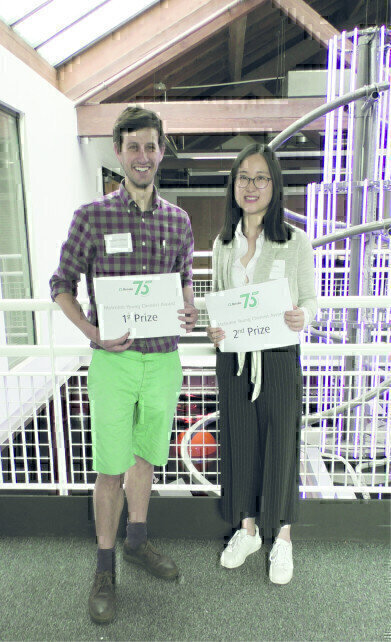-
 Alastair Lennox and Hang Xiang
Alastair Lennox and Hang Xiang
News
Metrohm Young Chemist Award Winners
Jul 25 2018
This year, Metrohm AG celebrates their 75 anniversary. To mark this occasion, young chemists had the chance to submit their research in a competition to show the company’s appreciation of the contribution they are making towards scientific development.
In the UK and Ireland, Metrohm UK had a great response to the competition and a team of experts had the hard task of choosing the winners. The awards were presented at a networking event at the Museum of Science and Industry, Manchester, on the 6th June.
In 1st place: Alastair Lennox, University of Bristol
Name of research project: Electrochemical Alpha-Cyanation of Secondary Piperidines
“My research is in the field of organic electrochemistry, which is currently becoming a very popular tool for organic synthesis. By using an anode or cathode, traditional redox reagents, which are often toxic or produce a lot of waste, can be replaced. Therefore, it is a much more sustainable way to do organic reactions. In this work, I have optimised a reaction that cyanates simple secondary amine compounds with high selectivity and good functional group tolerance. The results should have broad implications for the sustainable manufacture of complex organic molecules, including new drug and agrochemical compounds.”
Alastair did his undergraduate studies in at the University of Manchester and PhD studies in Bristol, with a short period in the US, and is now currently back in Bristol.
In 2nd place: Hang Xiang, Newcastle University
Name of research project: Enhanced electrochemical production of carbonaceous products from CO2 in aqueous electrolytes
Hang started her PhD research in 2015 at Newcastle University after obtaining both Bachelor and Masters degrees in Chemical Engineering in China. Her PhD project focuses on ‘Electrochemical CO2 conversion into chemicals and fuels’, which is funded by SAgE Doctoral Training Award and Overseas Research Scholarship from Newcastle University.
“Carbon dioxide (CO2) is the chief culprit of global warming. Electrochemical reduction (ER) is one of the most economical ways to utilise this most abundant and cheapest carbon source. This process only use electricity and water, as inputs to produce higher-energy carbon-based products and a co-product of pure oxygen. Within 2 years’ study, I’ve successfully built up an advanced reactor by 3D printing technology which removed CO2 mass transfer limitation and largely improved the reaction rate. With our development on electro-catalysts, C1 (either CO or formate) could be produced with >90% selectivity in high yield, which is promising for large-scale production and shows a potential for commercialisation.”
Metrohm would like to congratulate both Alastair and Hang and wish them every success with their research in the future.
Learn more about applied and theoretical electrochemistry
Digital Edition
Lab Asia Dec 2025
December 2025
Chromatography Articles- Cutting-edge sample preparation tools help laboratories to stay ahead of the curveMass Spectrometry & Spectroscopy Articles- Unlocking the complexity of metabolomics: Pushi...
View all digital editions
Events
Jan 21 2026 Tokyo, Japan
Jan 28 2026 Tokyo, Japan
Jan 29 2026 New Delhi, India
Feb 07 2026 Boston, MA, USA
Asia Pharma Expo/Asia Lab Expo
Feb 12 2026 Dhaka, Bangladesh


















